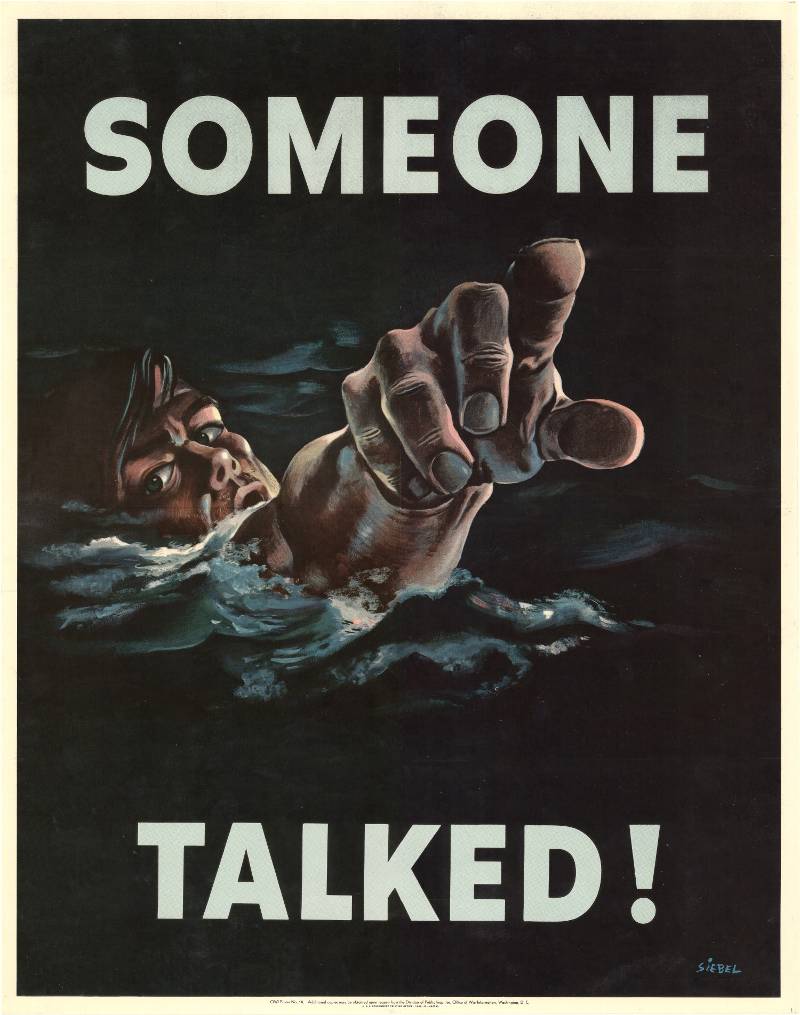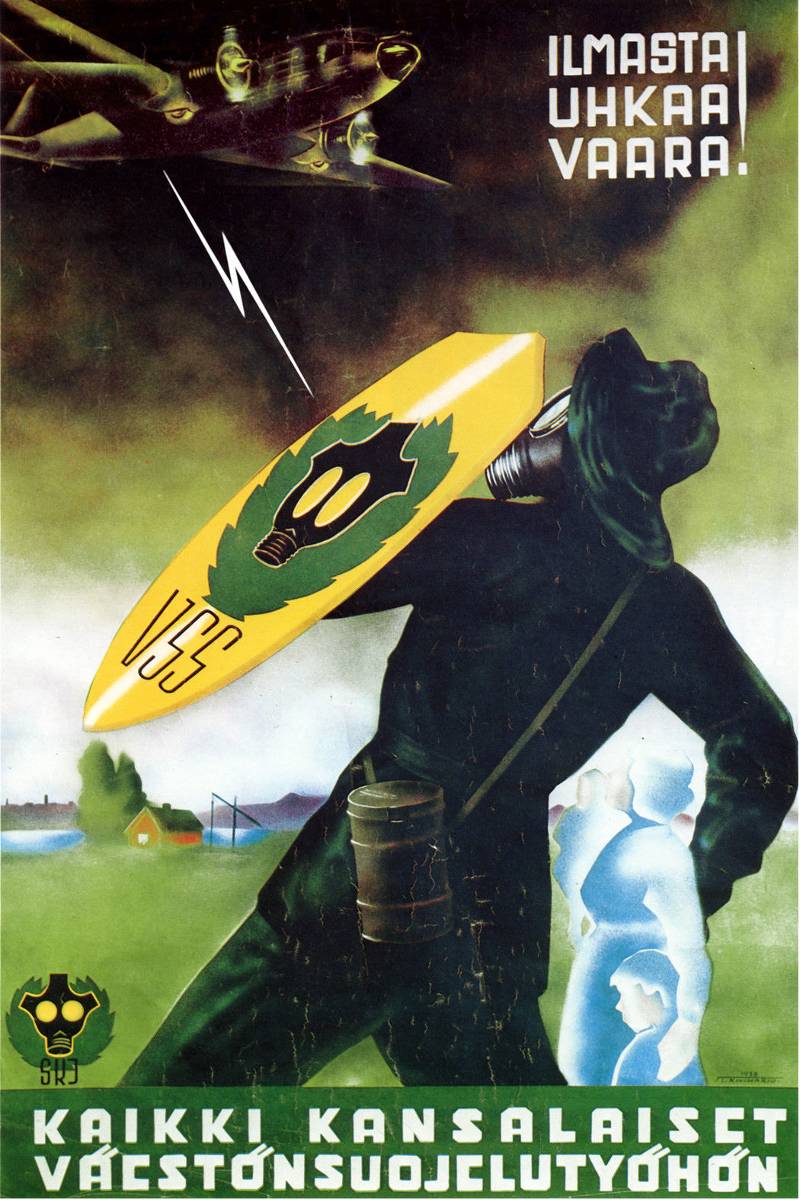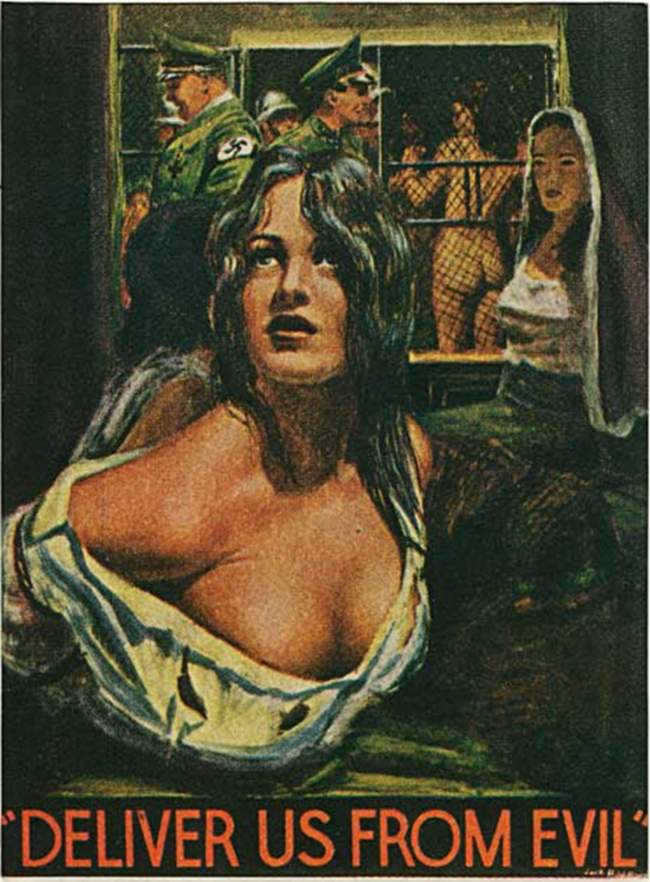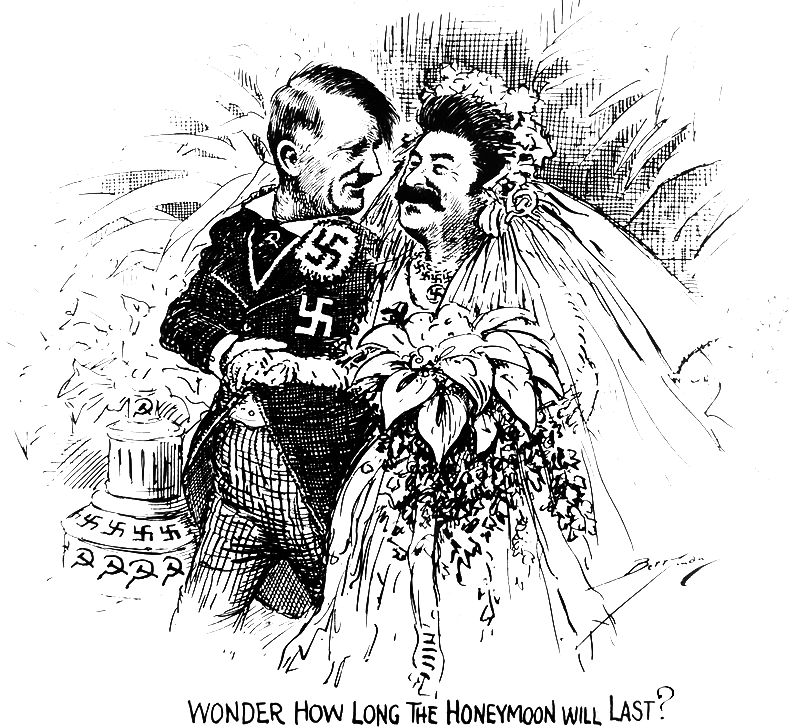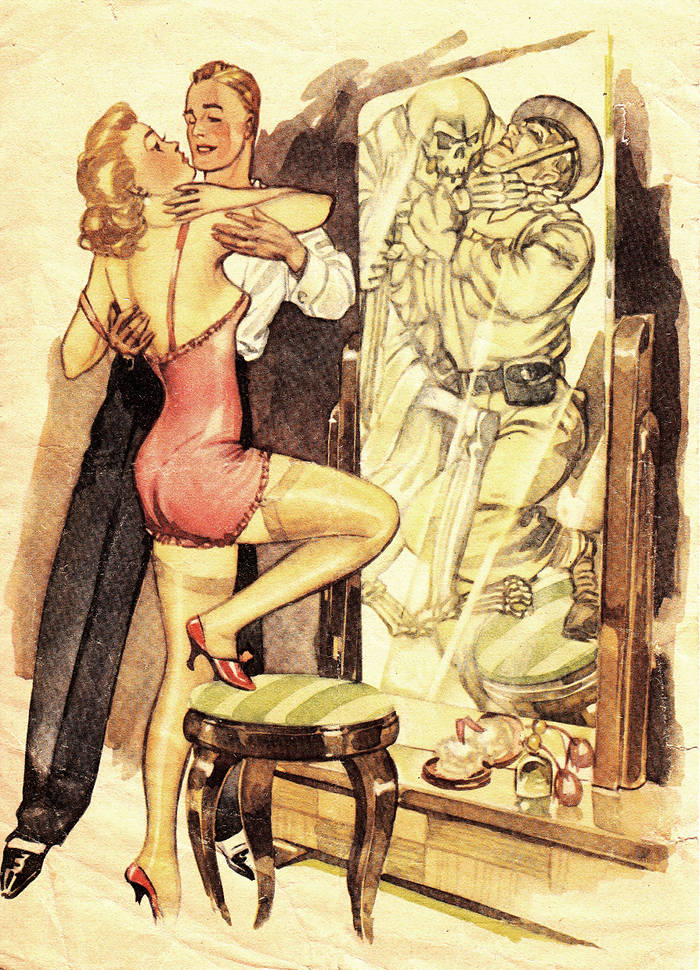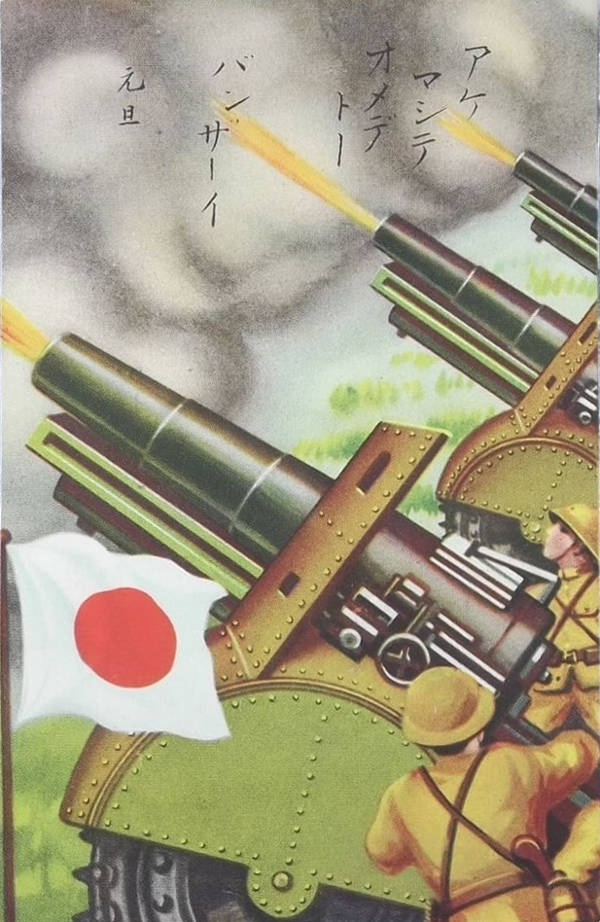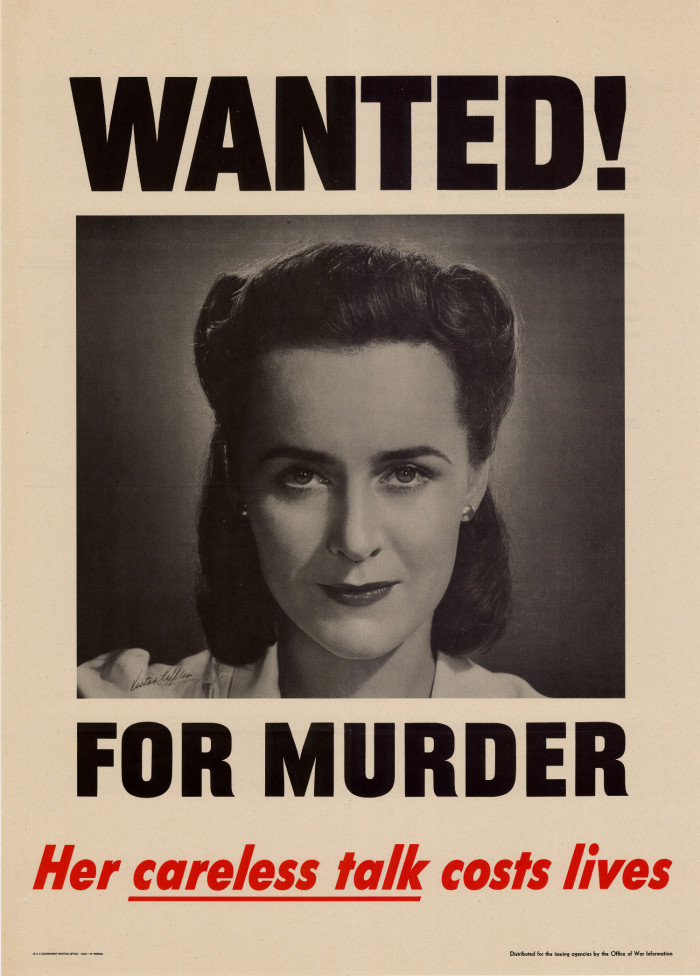WW2 propaganda piece demonstrating that “loose lips sink ships.”
Tag: Propoganda
Finnish Civil Protection, 1939
Deliver Us From Evil, 1940s
80 years ago, USSR invades Poland…
Japan’s Rosie the Riveter
Mirror-Wise: A Precarious Story, 1944
(On back of leaflet)
Mirror-wise: A Precarious Story
Joan was in her room and just about to change because she intended to go to the Cinema with Bob. She had done that quite often since John, her husband had left for the front. Why should she? Bob is a good friend of John’s and he certainly wouldn’t object. Everybody understands that Joan cannot always sit at home alone for years without any companionship.
Yesterday, Bob came a little earlier than usual and entered Joan’s room just as she was adding the last touch of rouge. She didn’t mind his staying for they were really good friends – and so accustomed to each other.
As she rolled on her stockings, Bob told her all that he had done during business hours that day and then she noticed that the elbow of his jacket had a little grease spot; so she took it and cleaned it. What could anybody think wrong about that – among friends.
And then……. Neither knew how it happened, she felt his strong body leaning gently against her, and then, they kissed, for a long, long while.
Joan was in a dream, she was feeling that marvellous something that she had missed for so long, it was so wonderful.
Then she opened her eyes, and there was that horror before her. Was it a dream, or was it reality?
She looked in the mirror and saw…. John! John in the arms of another! In the arms of Death!
But no, it was not John embraced by Death, it was YOU, and it was not Joan looking in the mirror but YOUR wife.
Joan is still alone.
And so are all the millions of other wives and girls.
But war goes on.
(Nazi propaganda piece from 1944)
Art of War, Japan, 1930s
Wanted! For Murder
Today – The Bull’s-Eye
From the How To Shoot The U.S. Army Rifle, The infantry journal handbook, 1943

KCCO, 1939
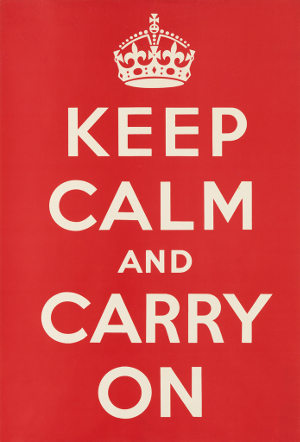 When Britain formally declaring war on Germany on September 3, 1939, the newly re-formed British Ministry of Information immediately began working on a giant poster publicity campaign to prepare the British populace for what the ministry feared would be an “appalling series of shocks, resulting in shattered nerves, a lack of confidence in ultimate success, and therefore a lack of will to work for victory” (Three Posters). The posters were intended as “general reassurance material” (ibid.). Three slogans were chosen and put into production on broadsides with white text against boldly colored backgrounds. Instead of a photograph or an illustration, each poster bore a depiction of the crown of King George VI at the top as an indication that the messages came from the King himself. The first two of these posters, “Freedom is in Peril / Defend it With All Your Might,” and “Your Courage Your Cheerfulness Your Resolution Will Bring Us Victory,” were distributed and posted around Britain in late September and October, 1939. The third, and now most famous, of these slogans was kept back in anticipation of a truly horrific incident, such as the invasion of Britain by German forces or a severe air raid. As it turned out, the first eight months after the British and French declared war on Germany (September 1939 – May 1940) proved to be largely uneventful for both the military and civilians. This time, now referred to as the “Phoney War,” was a period in which none of the Allied forces engaged the enemy in any serious land offensive. To paper the country with posters encouraging the populace to defend freedom and to project optimism, while keeping their stiff upper lips firmly in place when nothing was happening, turned out to be something of a public relations disaster. The public did not respond well to the first two posters. “The wording of ‘Your Courage . . . will bring us victory’ was criticised. There was some evidence the combination of ‘your’ and ‘us’ ‘suggested to many people that they were being encouraged to work for someone else,’ with the ‘your’ referring to the civilian, the ‘us’ to the Government. ‘Freedom is in Peril’ was also deemed ineffective, blamed on ‘the abstractness of the words, not one of which had any popular appeal'” (ibid.). The Times had described the posters as “egregious and unnecessary exhortations,” “insipid and patronising invocations,” which were unneeded and wasteful of funds (ibid.). Since the expected, immediate German attack never materialized, and because the earlier posters had been met with such derision, “Keep Calm and Carry On” was never posted and was kept in storage for years. After the war, the remainders were scrapped for their pulp. Contemporary reports cite that almost two and half million copies of the poster were printed. An HMSO (His Majesty’s Stationery Office)
When Britain formally declaring war on Germany on September 3, 1939, the newly re-formed British Ministry of Information immediately began working on a giant poster publicity campaign to prepare the British populace for what the ministry feared would be an “appalling series of shocks, resulting in shattered nerves, a lack of confidence in ultimate success, and therefore a lack of will to work for victory” (Three Posters). The posters were intended as “general reassurance material” (ibid.). Three slogans were chosen and put into production on broadsides with white text against boldly colored backgrounds. Instead of a photograph or an illustration, each poster bore a depiction of the crown of King George VI at the top as an indication that the messages came from the King himself. The first two of these posters, “Freedom is in Peril / Defend it With All Your Might,” and “Your Courage Your Cheerfulness Your Resolution Will Bring Us Victory,” were distributed and posted around Britain in late September and October, 1939. The third, and now most famous, of these slogans was kept back in anticipation of a truly horrific incident, such as the invasion of Britain by German forces or a severe air raid. As it turned out, the first eight months after the British and French declared war on Germany (September 1939 – May 1940) proved to be largely uneventful for both the military and civilians. This time, now referred to as the “Phoney War,” was a period in which none of the Allied forces engaged the enemy in any serious land offensive. To paper the country with posters encouraging the populace to defend freedom and to project optimism, while keeping their stiff upper lips firmly in place when nothing was happening, turned out to be something of a public relations disaster. The public did not respond well to the first two posters. “The wording of ‘Your Courage . . . will bring us victory’ was criticised. There was some evidence the combination of ‘your’ and ‘us’ ‘suggested to many people that they were being encouraged to work for someone else,’ with the ‘your’ referring to the civilian, the ‘us’ to the Government. ‘Freedom is in Peril’ was also deemed ineffective, blamed on ‘the abstractness of the words, not one of which had any popular appeal'” (ibid.). The Times had described the posters as “egregious and unnecessary exhortations,” “insipid and patronising invocations,” which were unneeded and wasteful of funds (ibid.). Since the expected, immediate German attack never materialized, and because the earlier posters had been met with such derision, “Keep Calm and Carry On” was never posted and was kept in storage for years. After the war, the remainders were scrapped for their pulp. Contemporary reports cite that almost two and half million copies of the poster were printed. An HMSO (His Majesty’s Stationery Office)
via Swann Auction Galleries
